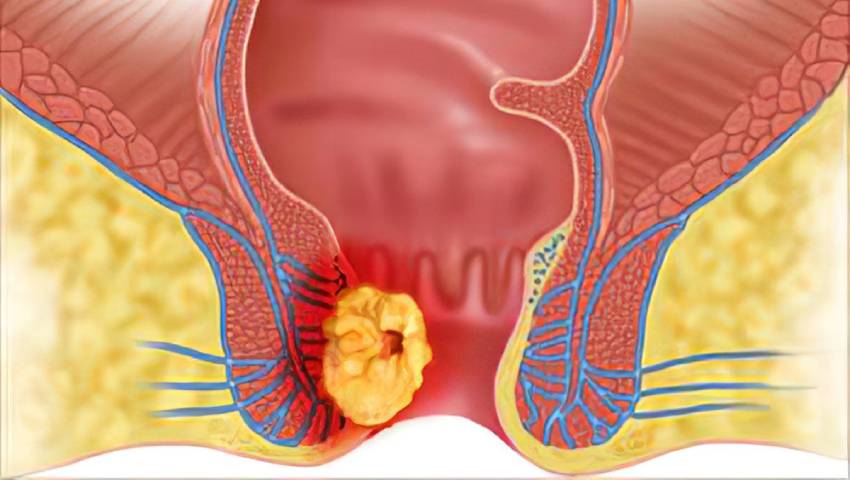
Anal cancer is a rare type of cancer that affects the anus. In this blog, Dr. Arun Nair, a well- known Colorectal Surgeon & Proctologist in Thrissur, shares all information about the anal cancer treatment. If you and your loved someones are suffering from any proctological or anal issue and looking for the best treatment, then you consult With a Gastroenterologist in Thrissur Dr. Arun S Nair for treatment.
What Is Anal Cancer ?
Anal cancer is a form of cancer that develops in the anus, the terminal opening of the rectum through which coprolite is expelled from the body. While considered fairly uncommon, it’s pivotal to fete its signs and symptoms. Beforehand discovery and treatment are essential, emphasizing the significance of alert in covering for any implicit suggestions of this type of cancer. By staying informed and attuned to implicit symptoms, individuals can seek prompt medical attention, easing timely opinion and intervention if necessary.
Symptoms Of Anal Cancer:
- Anal Bleeding
- Anal Pain or Discomfort
- Changes in Bowel Habits
- Itching or Discharge
- Lumps or Masses
- Weight Loss and Fatigue
Causes Of Anal Cancer:
Anal cancer is generally caused by infection with high- trouble strains of the mortal papillomavirus( HPV), a group of contagions that can infect the genital and anal regions. patient infection with high- trouble HPV strains, particularly HPV types 16 and 18, is a significant contributor to the development of anal cancer.
- Weakened Immune System: Individuals with compromised vulnerable systems, similar to those with HIV/ AIDS or those who have experienced organ transplantation, face an advanced threat.
- Smoking: Long-term and heavy is associated with an increased likelihood of anal cancer.
- Anal Intercourse: Engaging in receptive can heighten the risk of HPV infection, potentially contributing to the development of anal cancer.
- Age and Gender: Anal cancer is more prevalent in older adults and appears to affect women more frequently than men. Nevertheless, rates of anal cancer have been increasing in both genders.
- Multiple Sexual Partners: Having multitudinous Sexual mates increases the threat of HPV infection, a significant procurator in the evolution of anal cancer.
Risk Factors Of Anal Cancer:
The risk factors associated with anal cancer, as recognized by medical professionals like Dr. Arun Nair, include:
- HPV Infection: infection with high- trouble strains of the mortal papillomavirus( HPV), especially mores 16 and 18, is a primary trouble factor for anal cancer.
- Weakened Immune System: Individuals with compromised immune systems, such as those with HIV/AIDS or who have undergone organ transplantation, are at an increased risk.
- Anal Intercourse: Engaging in open can heighten the threat of HPV infection, potentially contributing to the development of anal cancer.
- Age and Gender: Anal cancer is more common in older adults, and it tends to affect women more frequently than men. However, rates of anal cancer have been rising in both genders.
Diagnosis Of Anal Cancer:
Dr. Arun Nair guides you through the process of diagnosis which incorporates an intensive assessment of your clinical history, an actual examination, anoscopy or proctoscopy, a biopsy, and different imaging concentrates on like X-ray, CT Output, and PET Sweep.
- Medical History and Physical Examination: The clinical benefits provider, essentially comparable to Dr Arun Nair, will accumulate an organized clinical history, including incidental effects and bother procurators, and guide a concentrated genuine evaluation, including a rectal evaluation.
- Anoscopy or Proctoscopy: These procedures involve utilizing a lighted pipe to examine the anus and rectum for any abnormalities.
- Biopsy: Confirming cancer presence is vital, is a key step. This involves taking a small towel sample from the suspicious area in the anus, which is also examined under a microscope for a definitive opinion.
Treatment Of Anal Cancer:
The treatment of anal cancer is substantiated and predicated on factors analogous to the stage of the cancer, the size and position of the excrescence, and the overall health of the case. Common treatment modalities for anal cancer include:
- Surgery: Local Excision: In early- stage anal cancer, a fragile tumour may be removed through original excision. Lymph Node Dissection: Surgery may involve the removal of nearby lymph nodes to check for cancer spread.
- Radiation Therapy: External Beam Radiation: High-energy rays are targeted at the cancer from outside the body to destroy cancer cells.
- Brachytherapy: Radioactive sources are placed directly into or near the tumour to deliver targeted radiation.
- Chemotherapy: Medications are administered orally or through veins to kill cancer cells or stop their growth.
- Topical Chemotherapy: Creams or ointments containing chemotherapy drugs may be applied directly to the affected area.
- Combined Modality Therapy Chemoradiation: A combination of chemotherapy and radiation remedy is constantly exercised for more improved stages of anal cancer. This path is especially operative in treating anal cancer associated with mortal papillomavirus( HPV) infection.
- Targeted Therapy: In cases where the cancer cells overexpress a protein called HER2, targeted therapy with trastuzumab may be considered.
If you have any questions related to Anal Cancer? If you need Anal Cancer treatment in Thrissur then consult with Dr. Arun Nair at Elixir Clinic, Thrissur.
Recent News

How to Manage Fatty Liver?
14th April 2025
Is Your Constipation Constant? Here’s What
21st March 2025
When Should You Consider Surgery for
12th March 2025
What is Swallowing Disorder? How to
27th February 2025
Is Laser Surgery Good for Anal
3rd February 2025
5 Early Signs of Liver Damage
8th January 2025
The Differences Between Crohn’s and Ulcerative
21st December 2024
Diagnosed with IBD? Here’s What You
10th December 2024
Gallbladder Stone Treatment Pros and Cons
21st November 2024
7 Silent Signs You Have A
24th October 2024Contact info
1ST FLOOR ZABS FORT building, Civil Lane Road, Poothole P.O, Thrissur, Kerala 680004
Church Post Office Road near Parumala, Thiruvalla, Kerala 689626
+91-9539988886
drarungastrosurgeon@gmail.com
St. Gregorios Hospital, Thiruvalla
The Gastro Clinic(Elixir Clinic), Thrissur
© 2025 Dr Arun Gastro Surgeon All rights reserved



